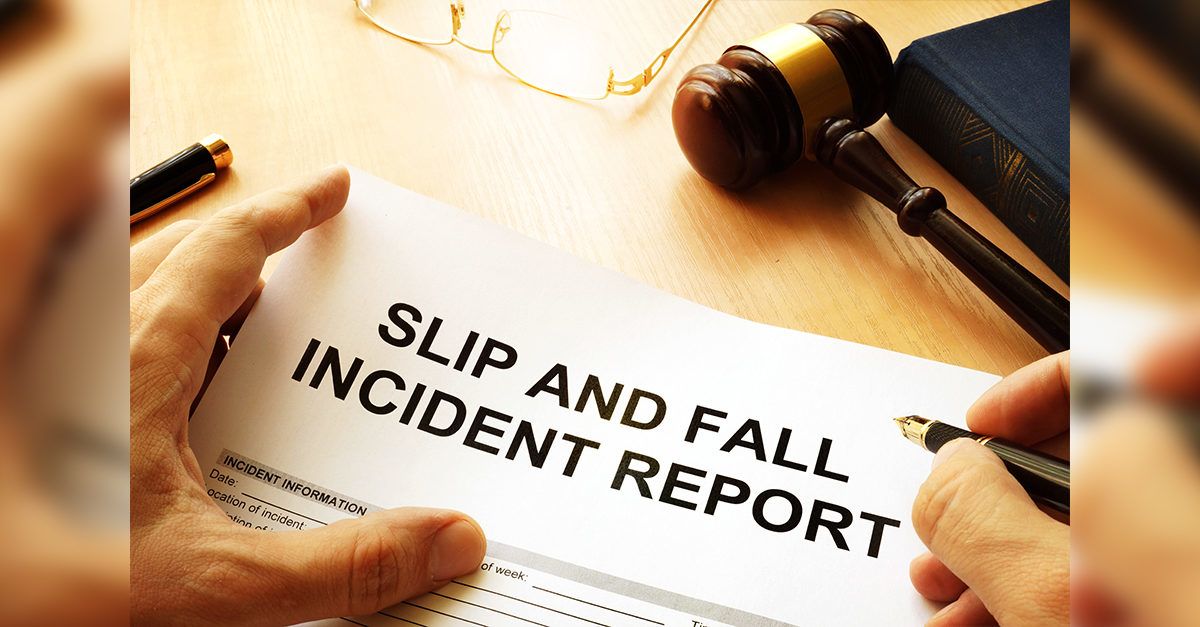
Not all law firms will evaluate a slip and fall case, but here at Blaszkow Legal, it is one of our significant practice areas! Slip and Falls happen anytime, and anywhere, and can be on private property, on public sidewalks, at the mall…in short: anywhere! A slip and fall case is classified as a premises liability claim, because the person or entity that is using or owning that property, may be liable for incidents that happened on that property as the result of negligence. There are many different ways in which a property owner or operator may be liable for injuries that occur. This liability can be when the owner fails to fix a dangerous condition or defect, fails to warn people about this defect or condition, or fails to take reasonable steps to inspect and investigate that these dangerous conditions exist. If you have been involved in a slip and full case anywhere in Virginia, Maryland, or DC, then call us right away for a free case consultation.
Slip and fall cases can result in serious injuries. Many times, people suffer sprains and strains of various extremities or the back. Other time, the injuries can be much worse. We have seen slip and fall cases that have resulted in broken bones and dislocated joints, and in a very small percentage of cases, even death as a result of complications. Because these cases have the potential to be so significant, it is very important to begin the investigation right away. Some things however, will happen that will interfere with getting this investigation started. You never ever ever want to make that mistake. Always talk to a slip and fall lawyer immediately.
There are certain mistakes that a lot of people make because of some information out on the internet, and in other cases, because tricky insurance adjusters give people guidance that steers them in the direction the insurance companies want to go, rather than in the direction that is best for the person who is hurt. For example:
- Taking early settlement offers. When an injured person takes a settlement offer, they have ended their case, because the insurance companies will require you to endorse a settlement release. This release does what it says, and releases them from liability. So if that pain in your neck turns out to be a slipped disc that requires fusion and surgery after a year of rehabilitation, you can’t go back and ask for more money if you have already settled your case.
- Not getting enough information about the fall. We’ll talk more about this below.
- Not notifying the business. If you have been involved in a slip and fall, you have got to tell somebody about it! Tell a store staff member, supervisor or manager, or property owner. If you’re not helping them to generate their report on what happened, you may be placing your claim in danger.
- Not taking pictures. Pictures are some of the best evidence that we can use to prove what happened, where, and how. If you slip and fall on some grease that was left on the floor, and someone comes by and cleans it up after you report it, how can we prove that the grease was there? How can we prove that you just didn’t slip because you were wearing the wrong shoes? Documenting the area of the fall is of paramount importance!
If you have been injured in a slip/fall, take these steps!
An experienced personal injury attorney is going to begin an investigation as soon as you walk in the door to the office. That is what we do at Blaszkow Legal. We have a team of attorneys, paralegals, and investigators who we unleash right away to begin gathering evidence to prove your case. However, some things we cannot find because the information is too transient. Things can change between the time of the fall, and the time you come to an attorney. So it is important that you get some information before when you come in, to help us better build your case.
Here are four things that will help us to maximize your recovery, and build your claim:
- Pictures and videos
- Witness information
- Employees present
- Contact with the property owner / File a Report
Pictures and Videos
Pictures and video are listed first because they are the most objective, and the absolute best forms of evidence that we can get in a slip and fall case. Remember, it is not enough for us to allege that you fell, but we have to prove how you fell, and on what. A picture is worth a thousand words, and that includes in a personal injury claim. Far too often, people come to us and say that they fell, but cannot identify what they fell on! For example: there is a huge difference between someone slipping on a puddle of soda, and a puddle of water. A puddle of water could be indicative of a leaking pipe, whereas soda on the ground could be indicative of another guest spilling something, only moments before. You have to remember that just because an incident happened on a property owner’s property, does not mean that they are automatically responsible.
Document everything! Take pictures of the spill or whatever you fell on, of the area, of cracks in the sidewalk, of nearby shelving, anything that may be related, even just a little bit! If there are employees nearby, don’t hesitate to take pictures of them!
In a world where we have almost limitless space on our phones, you cannot take too many pictures of the accident scene.
As you’re taking your pictures, look at them. Look at them to make sure that you know what you’re looking at, because you may have to testify later on to authenticate that picture. If you don’t know what you’re looking at right after you took the picture, how are you going to know on the witness stand, two years later? If you slipped on a substance, make sure you take pictures from an angle that shows there is something on the floor.
Witnesses
Witnesses are extremely important to your case, because they can testify to how you fell, and speak about the area of the dangerous condition, or may have any other knowledge about the situation, and what caused it. Sometimes, witnesses can help us prove that the property had notice of the dangerous condition. Notice is extremely important. The property owner can claim that they had no notice of the dangerous condition, and that it was just put there. If they are correct, and they never had time to address it, they may not be liable!
Notice however comes into parts: actual notice and constructive notice.
Actual notice is very basic, in that the property owner absolutely knew, like someone told them. Notice refers not just to the manager, but also staff. For example, if there’s a whole section of floor that has just been waxed, and the employee never put up any warning signs, then the employee of the business created that condition. They (the business) have actual notice, because they (representatives of the business) did it. They physically saw it, and in this situation, negligent failed to take reasonable steps.
The next kind of notice is constructive notice, which is when they should have seen something had they used a degree of reasonable diligence and inspection. An example of that would be a huge puddle of cleaning solution on the floor right in front of a cashier, that’s been sitting there for the 30 minutes. That cashier knew or should have known that the puddle was there, had he looked.
Witnesses can be a big help to fight the company’s argument that they had no idea. Sometimes you will be approached by people that say “I almost just fell there myself!,” “I told them to clean that up a while ago,” “someone fell there this morning,” etc.
You can never rely on a store to record witness information. Even if they get the witness information, they may not share it with you, or your attorney. Now, that information can be gotten via a subpoena, but that’s only once a lawsuit is filed. We need to interview people right away, because people’s memories fade over time. You need to make sure that you get every witnesses’ full contact information. You need:
- First and last name
- Email address
- Home address
- Phone number
- Work phone number
- Any other identifying facts
Employees
Individual employees are tremendous sources of information, and can sometimes make or break a case. Employees are usually the people who are actually doing the thing is that cause the negligence in the first place, or perhaps they simply have some knowledge about what’s going on. But here again, when we try to investigate, the insurance companies and the at-fault businesses are not going to tell us who is working that day. It’s up to you to get the contact information of these people on the spot.
It is always best to get a first and last name, job position or title, and email address, if you can. Sometimes they’ll only give you a first name and last initial. That’s fine. It is a starting place for us, and allows us to demand testimony from these people at a later date. But if we do not know they exist, we have to rely on the other side’s representation of who was there that day. You may have seen this happen on television shows or in some of the great legal movies. An employee who saw everything is all of a sudden sent to the store across town, or across the state. In a huge case, that is not a work of fiction only. Companies can shuffle people around, to try to hide them!
Reports
It is absolutely vital that you speak to the manager on duty. You have to file a report how about your fall because this is how we are going to help prove your case, and get the other side to start their own investigation, before you even call us!
Many times, the manager, supervisor or other representative will take your statement. This is often a blank piece of paper where they just ask you to write down what happened. If they ask you to do that, that’s fine. Fill it out in as much detail as you can. But, always always get a copy! If the only thing that you can do is snap a couple of pictures of this piece of paper with your phone, then so be it. That is better than nothing.
Request a copy of the report. Do this in writing, if you can. Ask the store manager for an email address or fax number, and then send a written, confirming request for the report. Most times, they will either ignore you, or blatantly refuse to give it to you. But this still helps, from a legal perspective, because it shows that they knew that it happened, and it becomes much harder for some manager to stand up and say no, she never told me anything!
Ask the manager to document the scene. Ask them to take pictures before any remediation is attempted. By remediation, we mean mopping, cleaning, reshelving, things like that. Tell them that you want the fall location properly documented immediately. Here again, they may ignore you or refuse. It is still important that you make that request.
Do not take anything they offer! Many times managers will offer you free food or drink, free supplies, or other complimentary items. Sometimes, they are doing this with the intent of fobbing you off, and hoping that you will appreciate the free food as a method to make you go away. While accepting these items is generally not going to impair your case, you simply want to avoid any appearance of impropriety.
Contact a slip and fall lawyer immediately
Another piece of evidence that often we can get, but individual claimants cannot, is surveillance footage. Surveillance footage is often stored on a computer server, but will not stay there forever. These systems overwrite themselves every so often. Great systems will sometimes keep the footage for 30 days. Smaller systems with less storage space may only hold it for 72 hours!
Reach out to an experienced slip and fall lawyer immediately so that we can get notice to the other side to preserve this footage at once. This footage could be the key to making your case.
If you have been involved in a slip and fall then don’t let the insurance company push you around. Make sure that you are fighting with the best team possible, to get you all of the compensation that you deserve for your injuries. Set our team to work right away, and call Blaszkow Legal, PLLC for a free consultation – 703-879-5910.





